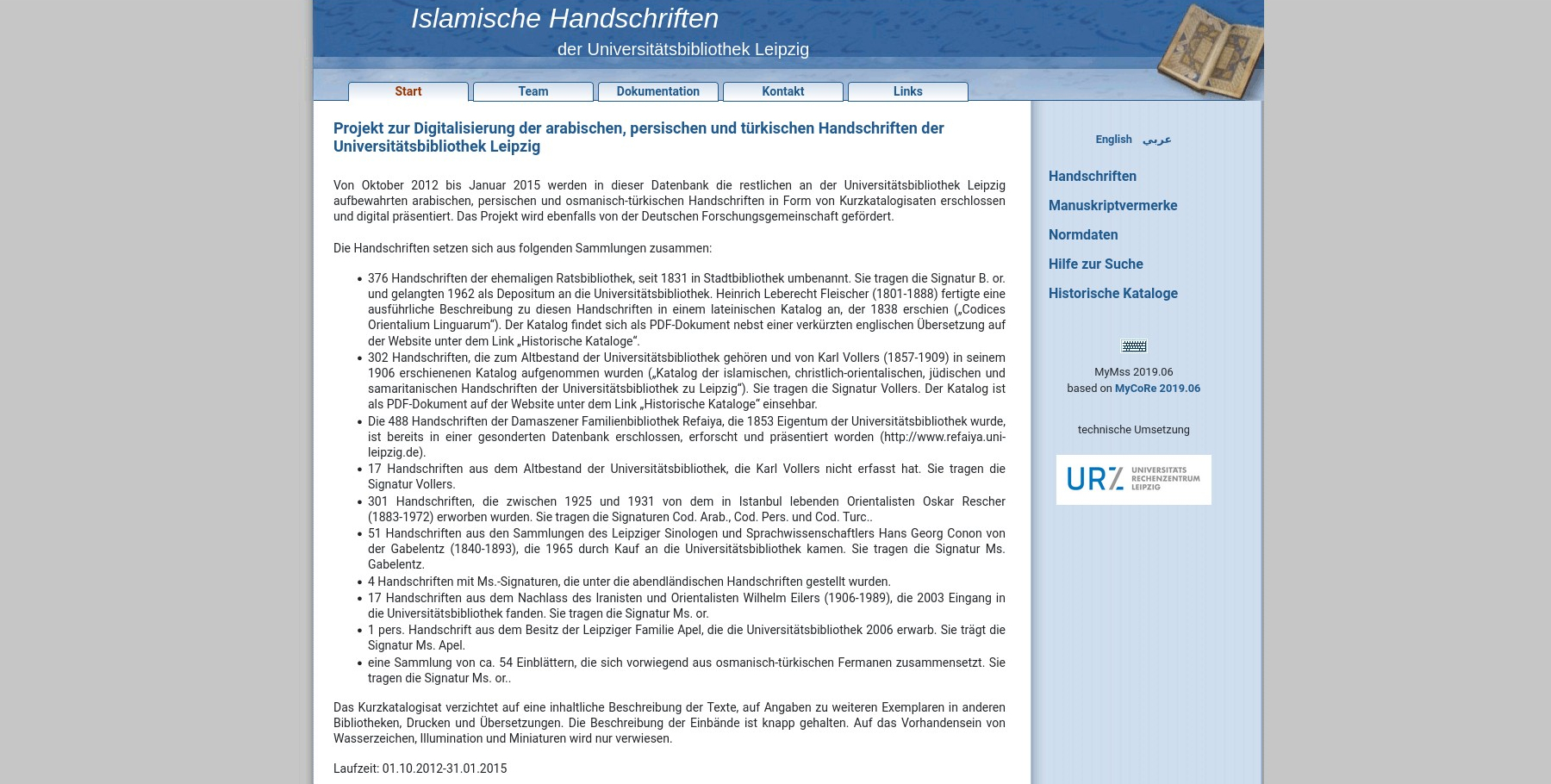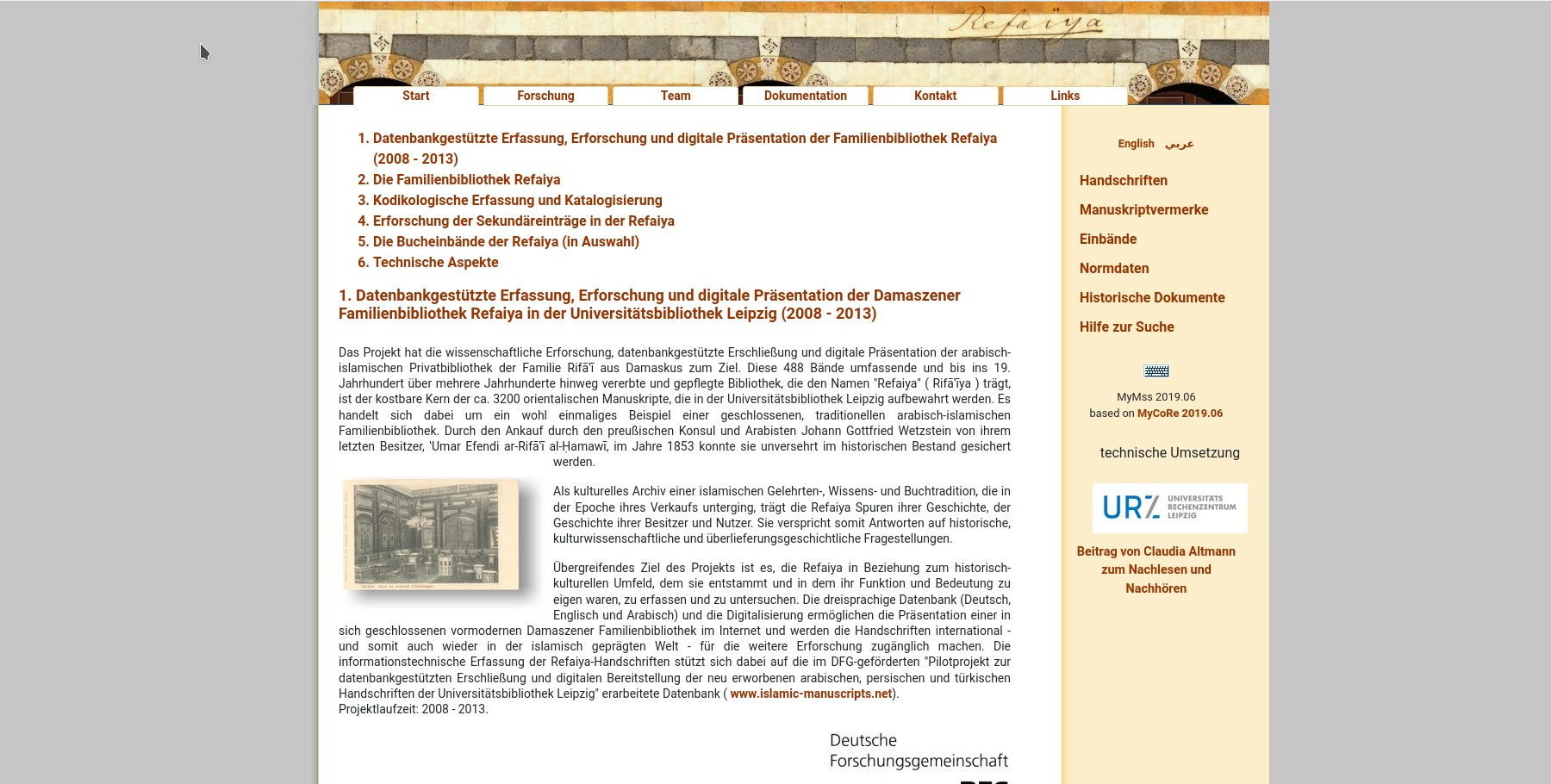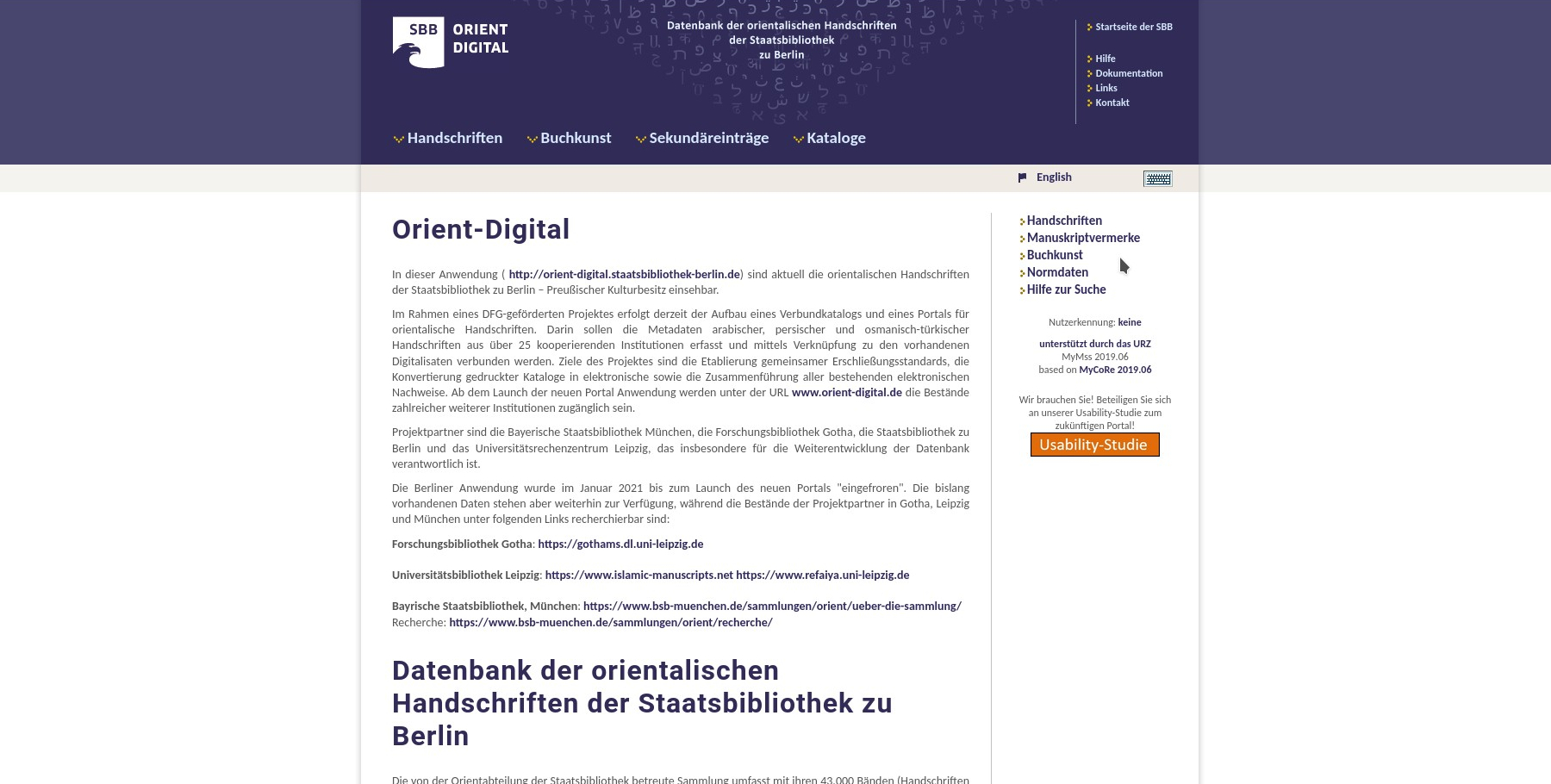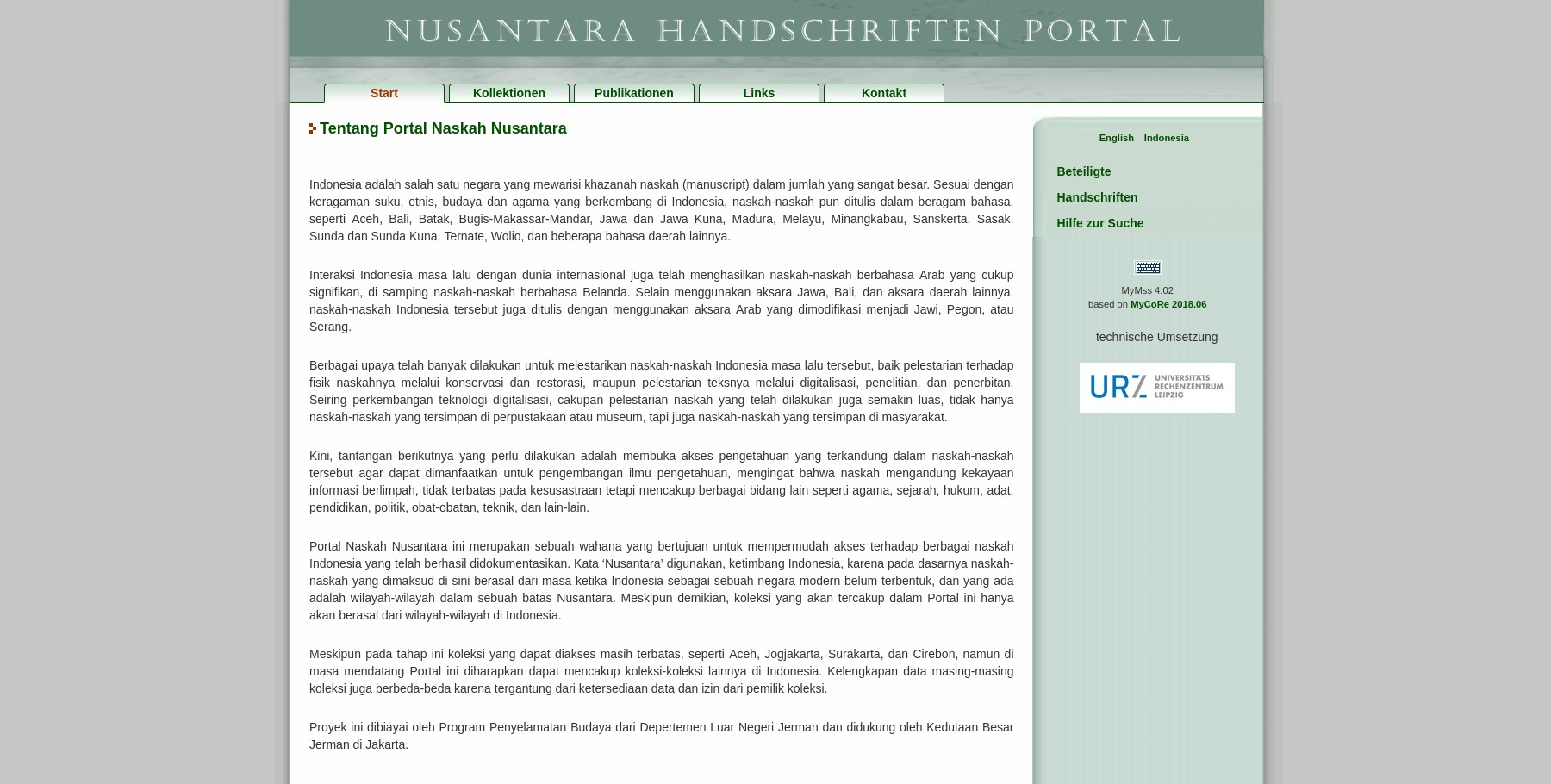Genese des Portals "Qalamos"
Die Leipziger Anfänge
In der zweiten Hälfte des Jahres 2005 einwickelte Frau Professor Dr. Verena Klemm vom Orientalischen Institut der Universität Leipzig (OIL) zusammen mit dem damals stellvertretenden Leiter des Bereichs Sondersammlungen der Universitätsbibliothek Leipzig (UBL), Herrn Dr. Christoph Mackert, die Idee für einen Datenbank-Prototyp zur Tiefenerschließung der arabischen, persischen und osmanischen Handschriften der UBL.
Für das von der Deutschen Forschungsgemeinschaft (DFG) geförderte Projekt wurde das Universitätsrechenzentrum Leipzig (URZ) als Technikpartner gewonnen. Hier gab es schon seit 2002 eine sehr erfolgreiche Kooperation mit den Entwicklern rund um Jens Kupferschmidt im Papyrus-Projekt Halle-Jena-Leipzig.
Von Juni 2006 bis März 2008 wurde das Vorhaben unter dem Namen Pilotprojekt zur datenbankgestützten Erschließung und digitalen Bereitstellung der neu erworbenen arabischen und persischen Handschriften der Universitätsbibliothek Leipzig realisiert. Hierbei kam das Framework MyCoRe zu seinem zweiten Einsatz in Leipzig. Das URZ hatte dieses im Rahmen des Papyrus-Projektes zusammen mit der Bibliothek Essen und der ThULB in Jena seit 2000 entwickelt. Die Erarbeitung des Datenmodells für die zu erfassenden Handschriften erfolgte auf Grundlage des an der Akademie der Wissenschaften zu Göttingen angesiedelten Langzeitprojekts Katalogisierung der orientalischen Handschriften in Deutschland (KOHD). Weitere Impulse und Konzepte brachte Dr. Thoralf Hanstein ein, welcher damals noch am OIL angestellt war.

Das Refaiya-Projekt und der Ausbau von IslamHS
Nach erfolgreichem Abschluss des Pilotvorhabens erarbeitete Frau Professor Verena Klemm – in bewährtem Team, verstärkt durch den 2006 angetretenen Direktor der UBL Prof. Dr. Ulrich Johannes Schneider und dem Leiter des Bereichs der Sondersammlungen Prof. Dr. Thomas Fuchs - ein Konzept zur Neuerschließung und Erforschung der Damaszener Familienbibliothek Refaiya (ar-Rifāʿīya), die im Jahr 1853 durch Kauf an die Universitätsbibliothek Leipzig gelangt war. Dieses Projekt, ebenfalls von der DFG gefördert, wurde auf der Codebasis des Pilotprojektes aufgesetzt und im Zeitraum Oktober 2008 bis bis Mai 2013 realisiert. Besonders die kodikologische Expertise von Beate Wiesmüller führte dabei zu einer weiteren Verbesserung des Datenmodells. Auch die von Frau Dr. Stefanie Brinkmann (OIL) im Rahmen ihres Engagements bei The Islamic Manuscript Association (TIMA) eingebrachten internationalen Kooperationen spielte in Hinblick auf die Erfassungskriterien und ihre Terminologie eine zunehmend wichtige Rolle.
Durch die im Kontext des Refaiya-Projektes erfolgte weitreichende Volltext-Erfassung von Besitzer- und Lesereinträgen durch Dr. Boris Liebrenz für Leipziger, Gothaer und Berliner sowie weitereSammlungen entwickelte sich das Modul für Manuskriptvermerke, das heute ebenfalls in Qalamos integriert ist.
Im Anschluss an das Refaiya-Projekt konnte dann eine weitere Förderung der DFG eingeworben werden, welche im Zeitraum Oktober 2012 bis Juni 2015 eine Tiefenerschließung des restlichen Bestands der insgesamt ca. 1800 an der UBL vorhandenen arabischen, persischen und osmanischen Handschriften durch Beate Wiesmüller ermöglichte. Inzwischen hatte sich sowohl das Framework MyCoRe wie auch die darauf basierende Anwendung dank der kontinuierlichen Arbeit im URZ zu einem modularen System weiterentwickelt, welches auch für weitere Ableger von IslamHS – so die damalige interne Projektbezeichnung – eignete.

Orient-Digital
Im Jahre 2010 begann die erfolgreiche Zusammenarbeit des URZ mit der Staatsbibliothek zu Berlin. Grundlage für die Anwendungen Orient-Digital und Turfan-Digital bildete die Migration einer DOS-Anwendung, die grundlegende Bestandsinformationen zu sämtlichen Signaturen aufwies. Diese Datenbank wurde von Dr. Hartmut-Ortwin Feistel, dem früheren Leiter der Orientabteilung, aufgebaut. Orient-Digital ging 2013 online und wurde bis zur Übernahme der Daten durch Qalamos kontinuierlich weiterentwickelt.
Im Rahmen dieser Kooperation wurde auch das Buchkunst-Modul zur Auszeichnung von Illustrationen und Illuminationen in den Handschriften entwickelt und durch die Staatsbibliothek zu Berlin finanziell gefördert. Dieses Modul ist nun Bestandteil von Qalamos.

Es wird international
In den Jahren 2008 und 2009 konnte auf Initiative von Professor Dr. Eckehard Schulz (OIL) und Dr. Thoralf Hanstein eine Kooperation mit der Indonesischen Nationalbibliothek und verschiedenen Sammlungen in den Regionen Banda Aceh und Zentral-Java geschlossen werden, bei denen ein in Leipzig gehosteter Ableger der Anwendung für die Dateneingabe direkt in Indonesien bereitgestellt wurde. Dieses Vorhaben wurde durch das Auswärtige Amt finanziell gefördert. Zwei Reisen zu den indonesischen Sammlungen, begleit von Gerald Hennig (URZ) und dem Restaurator der UBL Jörg Graf sowie Schulungen indonesischer Mitarbeiter in Leipzig machten auch diese Teilvorhaben zu einem Erfolg. Die Daten sind heute noch in Qalamos verfügbar.
Eine weitere Initiative zur Internationalisierung der IT-Lösung gab es durch Frau Dr. Stefanie Brinkmann und TIMA im Jahre 2013. Hier wurde eine weitere Applikation mit den gleichen Datenmodellen bereitgestellt, um eine remote-Dateneingabe in international verstreuten, kleinen und gefährdeten Sammlungen zu ermöglichen. In den Jahren 2014 und 2015 erfolgte bei Kongressen in Cambridge eine Vorstellung unserer Lösung. Leider wurde dieses Projekt durch TIMA im Jahr 2021 aus politischen und organisatorischen, aber auch Corona-bedingten Gründen eingestellt.

Die KOHD sucht eine Lösung
Beflügelt durch den Erfolg der bereits laufenden Anwendungen kam es 2014 auch zu einem Zusammentreffen mit Professor Dr. Tilman Seidensticker, dem Projektleiter der von der Akademie in Göttingen langfristig betriebenen Katalogisierung Orientalischer Handschriften in Deutschland (KOHD). Die KOHD erwog einen Umstieg auf eine digitale Katalogisierung und entschied sich auf Grund der guten Erfahrungen mit dem Projektkomplex MyMss (eine Namensanpassung von IslamHS) für diese Lösung. Seit 2016 ist nun auch KOHD-Digital mit gleichem Datenmodell mit im großen Boot digitaler Kataloge nichteuropäischer Handschriften. Nach Abschluss des KOHD-Vorhabens zum 31.12.2022 werden die Daten nach Qalamos überführt. Die Kompatibilität aller Teilprojekte durch einheitliche Nutzung aktueller MyCoRe-Versionen und die Anpassung der entsprechenden Applikations-Module ist voll gegeben, so dass eine Datenübernahme reibungslos erfolgen kann.

Weitere Anwendungen
Neben den bisher beschriebenen Anwendungen wurde seit Mitte 2015 eine Installation für die Forschungsbibliothek in Gotha am URZ vorgehalten. Auch diese Daten islamischer Handschriften sind inzwischen in Qalamos integriert.
Noch in Betrieb ist ein Ableger für den Katalog samaritanischer Pentateuchhandschriften der LEUCOREA Lutherstadt Wittenberg in Zusammenarbeit mit der Theologische Fakultät der Martin-Luther-Universität Halle-Wittenberg. Auch hier gibt es eine 1:1 Beziehung der Datenmodelle zum aktuellen Qalamos, so dass die Daten ggf. nach Qalamos überführt werden können.

Eine gemeinsame Lösung muss her
Bereits 2018 reifte in engem Austausch der Anwendungsnutzer und getrieben durch die sachlichen wie informationstechnischen Zwänge der Wunsch nach einer einheitlichen Anwendung für alle bisher erfassten Datenbestände sowie für die Integration bisher noch nicht oder nur unsichtbar katalogisierter Sammlungsbestände. Mit dem Ziel des Gesamtnachweises verband sich auch die Forderung nach standardisierten Metadaten. Mit dem laufenden Projekt wird nun dieser Wunsch Realität.
Dabei kam es auch mit Blick auf die Datenmodelle ab 2018 zu gravierenden technischen Änderungen. Die bis dahin in der Handschrift erfassten Personendaten wurden wie im Modul für die Sekundäreinträge ausgegliedert und schrittweise, so es möglich war, in die GND überführt. Gleiches galt für das Werk-Modul, bei dem es zu einer Differenzierung zwischen Werk und Handschrift sowie der Verzeichnung der Werke in die GND kam. Eine Realisierung all der neuen Aspekte erfolgte durch das Projektteam von Qalamos.
Fazit
In über 15 Jahren hat sich das kleine Vorhaben eines arabistisch-informationstechnologischen Pilotprojektes an der Universitätsbibliothek Leipzig zur elektronischen Katalogisierung arabischer und persischer Handschriften zu einem nun international anerkannten Portal an der Staatsbibliothek zu Berlin entwickelt. Initiiert, konzipiert und programmiert in Leipzig hat es sich durch die wissenschaftliche Ausrichtung unter Führung der Orientabteilung der Staatsbibliothek zu Berlin zu einem von der Fachwelt geachteten Recherche- und Nachweiswerkzeug entwickelt, welches auch in Zukunft eine Heimat für neue oder noch nicht sichtbare Sammlungen nichteuropäischer Handschriften sein wird. Dabei liegt der Schwerpunkt vor allem im Datenaustauch mit anderen Projekten und einer weiteren Vernetzung der Daten. MyCoRe und das gesamte IT-Konzept haben bewiesen, dass ein so langfristiges Datenbankprojekt realisierbar ist und Zukunft hat. Die Geldgeber all der Einzelschritte haben gut investiert und mit Qalamos ein hervorragendes Produkt für Wissenschaft und Forschung gefördert.
Leipzig, 12.08.2022
